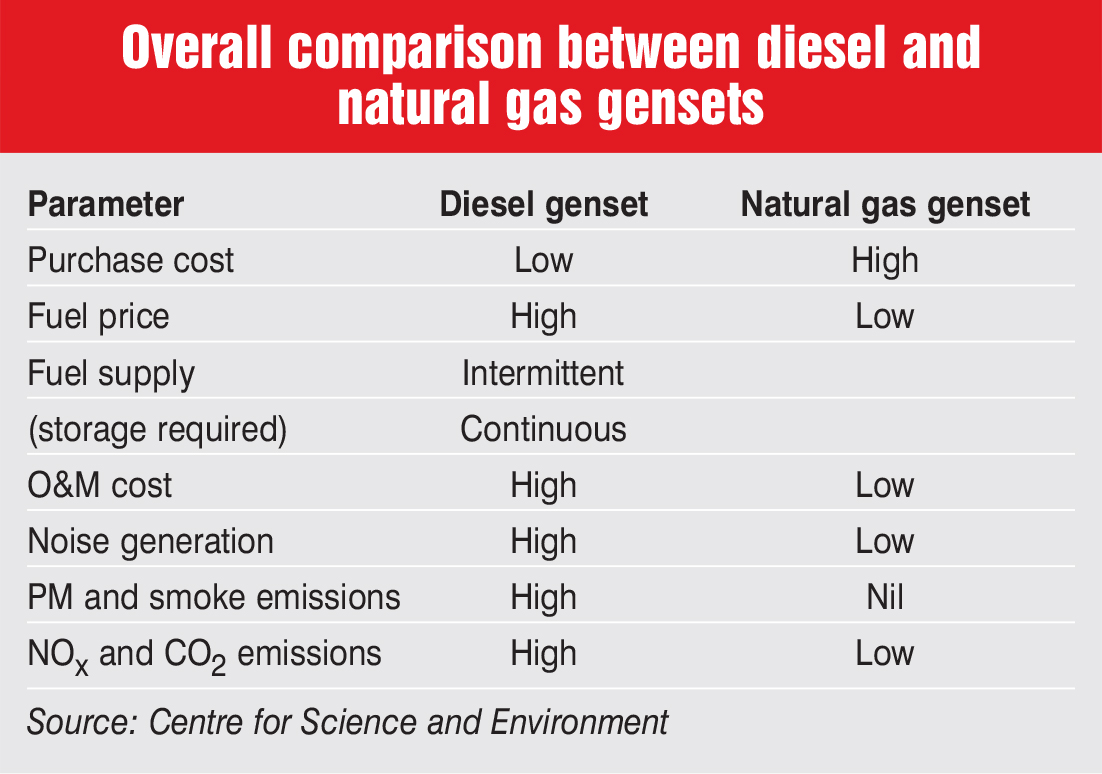Natural gas gensets are quieter and cleaner as compared to diesel-based gensets. The availability of natural gas in large quantities, relatively lower price of natural gas as well as growing concerns over carbon footprint and emissions have led to an increase in the demand for these gensets. Natural gas provides much longer runtimes and gensets running on it have 90 per cent fewer emissions compared to diesel generators. They are suitable for both residential and commercial segments and can be deployed for both emergency and portability purposes. With the increasing environmental concerns related to diesel generators as well as the rising price of diesel, the share of natural gas-based gensets is expected to grow in the coming years.
Natural gas gensets are increasingly being used in states such as Delhi, Gujarat and Maharashtra. It has the advantage of being readily available in large cities and is supplied directly through pipelines. Indraprastha Gas Limited, which is responsible for the supply of compressed natural gas (CNG) and piped natural gas (PNG) in the National Capital Region, has planned to replace diesel generators with gas gensets in housing complexes and factories, to help address the problem of rising pollution levels. Overall, industry studies suggest that the demand for natural gas gensets has increased across sectors such as commercial, IT, telecom and retail, across the emerging economies in the Asia-Pacific region (namely India, China and Japan). Globally, technologies related to natural gas, such as gensets, stationary fuel cells (SFCs) and microturbines, are witnessing infrastructure development. Natural gas gensets and other technologies are expected to experience capacity growth at a compound annual growth rate (CAGR) of 5.5 per cent through 2028, according to industry reports.
Cost economics
Although the initial one-time cost of a natural gas generator is higher than that of a diesel generator, due to low operational costs, natural gas gensets tend to be more economical over their lifetime. A 100 kW gas generator costs about Rs 1.2 million as compared to Rs 0.65 million for a diesel genset; however, a comparative analysis of the operational cost indicates that the additional cost incurred in purchasing a gas generator can be recovered in about four months (assuming that the genset is used for four hours of power backup and given the fact that gas is cheaper than diesel), according to a recent study done by the Centre for Science and Environment.
Furthermore, although the specific fuel consumption (SFC) of natural gas (34 standard cubic metres per hour) is higher than that of diesel (28 litres per hour), due to the difference in the market cost of diesel (Rs 80) and natural gas (Rs 35), the operational cost of natural gas gensets is lower vis-à-vis diesel gensets. In addition to this, the maintenance cost associated with natural gas gensets is very low unlike in diesel engines, where conditioning is required annually. There is also no scaling or sooting in gas gensets, and this lowers the maintenance cost. Besides, PNG does not require any storage tank or storage space since it is supplied through pipelines.

Environmental consideration
Natural gas gensets are a quieter, cleaner and a more efficient alternative to diesel gensets. The ecological benefits of natural gas are many. The burning of natural gas emits lower amounts of sulphur, nitrogen and carbon oxide. In light of the rising concerns for the environment and stricter regulations, natural gas gensets seem to be a better bet. The use of natural gas gensets reduces nitrogen oxide and carbon dioxide emissions by about 35-40 per cent. Natural gas gensets do not emit harmful particulate matter (PM) and smoke. Apart from this, natural gas does not produce a pungent odour, which is fairly common in diesel generators. The noise level of a gas genset is also lower than that produced by a conventional genset. Another advantage is that natural gas gensets are being used for off-site fuel requirements as they rely on a strong underground pipeline network, which remains unaffected by weather.
Conclusion
To conclude, over time with improvements in the design and efficiency, gas engines are able to meet code-driven start-time and load acceptance standards. In some applications, gas engines are the best choice due to emission rules and fuel security concerns. While diesel still rules the market in power generation, strict regulations and cost efficiency have encouraged natural gas-based generation technologies to be further integrated into the market. A clear policy roadmap offering incentives for the uptake of gas gensets and ensuring continuous supply of gas are expected to go a long way in promoting the deployment of gas gensets.



